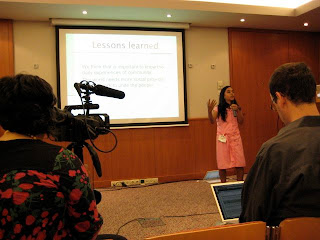I’ve just returned from two days at the 2008 Global Voices Summit in Budapest. Without a doubt, this was one of the most enriching experiences I’ve had since joining the world of participatory media and citizen journalism full-time. The first day of the program focused mostly on bloggers dealing with filtering and censorship in their respective countries. The second day was devoted to content and case studies, specifically with regard to the GV initiative Rising Voices; elections; China coverage and ways to create more spaces for cross-cultural communication; translation via GV’s Lingua offshoot; and the increasingly visible and defined intersection between blogging and positive social change.
Many bloggers, including Global Voices co-founder Ethan Zuckerman, and reporters more capable than I live-blogged (or almost live-blogged) the conference, which was also webcast and is now available for viewing on Ustream. As I listened and learned, in awe of the stories being told and the ideas shared, I tried to reflect on what all this might mean for Lebanon. How can we (all of us) render the stories from and current situations of Bolivia, Madagascar, Colombia (above, Catalina Restrepo talks about lessons learned at HiperBarrio in La Loma, Colombia, near Medellín), Armenia, Japan, Kenya, Iran (pro-reformist blogging community here in Farsi), Tunisia, Venezuela, China, India, Belarus, Pakistan, Egypt, Morocco, Hong Kong, Singapore, Thailand, Bangladesh, Syria, Ethiopia, Yemen, and Australia in the many contexts of civil society organizations and activists working in Lebanon?
As speakers summarized their particular experiences, they offered suggestions and listed lessons learned for how to apply social/participatory media, and especially blogging, in communities seeking positive social change. Here’s what I’ve condensed from my notes:
- Don’t let below-par connectivity be an excuse for inaction. It turns out that Lebanon sits pretty much smack in the middle of the global connectivity equation, with its 24.2 percent Internet penetration rate. I was encouraged to hear panelists talk about their successes in the midst of electricity cuts, rural outreach, and the expense of broadband. Whatever your access, update as consistently as you can, and in a crisis situation, as fast and as accurately as you can.
- Leverage your diaspora. Part of the evolution of globalization means that almost every country has a diaspora of some sort. Link up with these people, who also long for a connection with home. Create distributed buddy systems between bloggers; ask for donations; organize parallel events.
- Understand from the outset that technology, like money, is a tool, not a solution—its politics are neutral. It has as much potential for enhancing social justice and mutual understanding as it does for exacerbating inequality and fueling hatred. Similarly, you must contextualize the technologies you choose to your environment. If few people have Internet access in a community you’re trying to reach, consider uploading printable PDFs that can be distributed in print, or partner with local radio stations to read blog posts or other Web content.
- Join a community or social network, or if what you’re looking for doesn’t exist, create one. Communities ensure that when one of us needs support, another of us can provide it, whether we’re sharing best practices, pooling research, or just posting comments. Online communities and blogging communities allow us to do this no matter how far apart we live. Regional networks can provide important mid-range links and unite people who may deal with similar issues in similar contexts. Global networks are invaluable during crisis situations for getting the word out and generating aid contributions, as well as for aggregating data that can become part of a persistent record.
- Beware of self-censorship, which can be as stifling for the free flow of ideas as official censorship. A wide range of tools have been created to circumvent censorship and filtering enacted by governments. The harder levee to break, however, is the one inside your head that tells you it’s not appropriate, safe, expedient, polite, necessary, important enough, interesting to talk about “that,” whatever “that” is. As Neha Viswanathan reminded us in her brilliant talk about Blank Noise and the success of women bloggers in raising awareness and redefining street sexual harrassment, “You define the crisis. You determine what’s important.”
- In a crisis, answer the “How can I help?” question as soon as possible. For better and worse, the beginning of a crisis, natural or manmade, will draw the most attention and website “hits.” Bloggers, activists, and civil society organizations should be prepared to tell people what kind of assistance they can provide, whether financial, in-kind, or volunteer.
- Guard your reputation. Cherish accuracy. If you can’t verif
y potentially contentious information, wait to post it, or if it can’t wait, clearly label it as UNVERIFIED. Also, be on the lookout for data poisoning, an act in which someone submits incorrect data in an attempt to influence perceptions according to his or her own agenda.
I’m working on getting a translation of this into Arabic. Meanwhile, we’d love to hear about your experiences with and ideas for implementing Internet technology for positive social change here in Lebanon.



